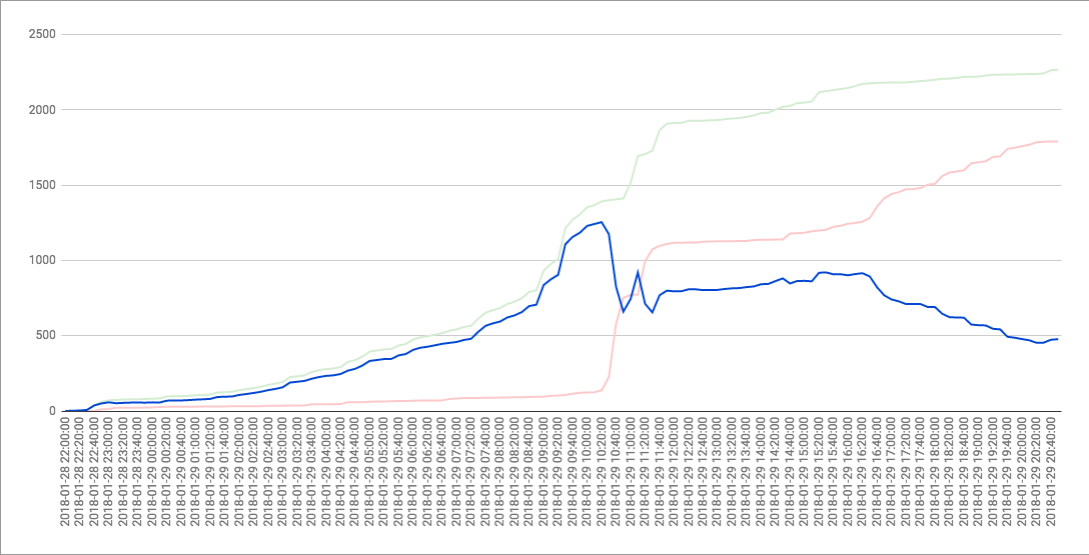Created
January 29, 2018 21:44
-
-
Save cryptoscopia/b62849ade1deb9c36a7131ceaf8d6f41 to your computer and use it in GitHub Desktop.
Parse Etherscan API transaction lists into a CSV of cumulative incoming, outgoing, and total values
This file contains bidirectional Unicode text that may be interpreted or compiled differently than what appears below. To review, open the file in an editor that reveals hidden Unicode characters.
Learn more about bidirectional Unicode characters
| #!/usr/bin/env python | |
| from __future__ import print_function | |
| import argparse | |
| from collections import OrderedDict | |
| from datetime import datetime, timedelta | |
| from decimal import Decimal | |
| import json | |
| parser = argparse.ArgumentParser() | |
| parser.add_argument('incoming', help='JSON transactions from API') | |
| parser.add_argument('outgoing', help='JSON internal transactions from API') | |
| args = parser.parse_args() | |
| # A place to gather the incoming transaction data | |
| data_in = OrderedDict() | |
| with open(args.incoming) as f: | |
| incoming = json.load(f) | |
| assert incoming['message'] == 'OK' | |
| for transaction in incoming['result']: | |
| # Skip invalid and zero-value transactions | |
| if transaction['txreceipt_status'] != '1' \ | |
| or transaction['isError'] != '0' \ | |
| or transaction['value'] == '0': | |
| continue | |
| # Round the timestamp down to the last 10-minute mark | |
| timestamp = datetime.utcfromtimestamp(int(transaction['timeStamp'])) | |
| rounded_minute = timestamp.minute // 10 * 10 | |
| timestamp = timestamp.replace(minute=rounded_minute, second=0, microsecond=0) | |
| # Convert value from gwei to ETH | |
| value = Decimal(transaction['value']) / Decimal('1000000000000000000') | |
| # First parsed row, store initial record | |
| if not data_in: | |
| first_timestamp = timestamp | |
| data_in[timestamp] = value | |
| last_timestamp = timestamp | |
| continue | |
| # We've already had a transaction for this 10-minute period, add this one to it | |
| if timestamp in data_in: | |
| data_in[timestamp] += value | |
| last_timestamp = timestamp | |
| continue | |
| # Fill in 10-minute periods without transactions with the total from | |
| # the previous period (probably unnecessary, but avoids gaps) | |
| while last_timestamp + timedelta(minutes=10) < timestamp: | |
| data_in[last_timestamp + timedelta(minutes=10)] = data_in[last_timestamp] | |
| last_timestamp += timedelta(minutes=10) | |
| # And now add the new 10-minute period with the cumulative total | |
| data_in[timestamp] = data_in[last_timestamp] + value | |
| last_timestamp = timestamp | |
| # This is where we'll gather the outgoing transaction data | |
| data_out = OrderedDict() | |
| # Start it off with 0 at the time of the first incoming transaction | |
| data_out[first_timestamp] = Decimal('0.0') | |
| # The reason I keep adding these silly *_timestamp variables is because I can't | |
| # do data_in.keys()[0] or data_in.keys()[-1], and I don't want to keep casting | |
| # them into lists. | |
| last_out_timestamp = first_timestamp | |
| with open(args.outgoing) as f: | |
| outgoing = json.load(f) | |
| assert outgoing['message'] == 'OK' | |
| for transaction in outgoing['result']: | |
| # Skip invalid and zero-value transactions | |
| if transaction['errCode'] != '' \ | |
| or transaction['isError'] != '0' \ | |
| or transaction['value'] == '0': | |
| continue | |
| # Round the timestamp down to the last 10-minute mark | |
| timestamp = datetime.utcfromtimestamp(int(transaction['timeStamp'])) | |
| rounded_minute = timestamp.minute // 10 * 10 | |
| timestamp = timestamp.replace(minute=rounded_minute, second=0, microsecond=0) | |
| # Convert value from gwei to ETH | |
| value = Decimal(transaction['value']) / Decimal('1000000000000000000') | |
| # We've already had a transaction for this 10-minute period, add this one to it | |
| if timestamp in data_out: | |
| data_out[timestamp] += value | |
| last_out_timestamp = timestamp | |
| continue | |
| # Fill in 10-minute periods without transactions as we did for incoming | |
| while last_out_timestamp + timedelta(minutes=10) < timestamp: | |
| data_out[last_out_timestamp + timedelta(minutes=10)] = data_out[last_out_timestamp] | |
| last_out_timestamp += timedelta(minutes=10) | |
| # And now add the new 10-minute period with the cumulative total | |
| data_out[timestamp] = data_out[last_out_timestamp] + value | |
| last_out_timestamp = timestamp | |
| # If the outgoing transactions end more than 10 minutes before | |
| # the incoming ones, fill in the empty periods at the end | |
| while last_out_timestamp < last_timestamp: | |
| data_out[last_out_timestamp + timedelta(minutes=10)] = data_out[last_out_timestamp] | |
| last_out_timestamp += timedelta(minutes=10) | |
| # Output our data in CSV format | |
| for k, v in data_in.items(): | |
| print('%s,%s,%s,%s' % (k, v, data_out[k], v - data_out[k])) |
Sign up for free
to join this conversation on GitHub.
Already have an account?
Sign in to comment
Created for use with PoWH coin: https://etherscan.io/address/0xa7ca36f7273d4d38fc2aec5a454c497f86728a7a
Register on etherscan.io and get an API key first
Fetch transactions with:
Fetch internal (which are outgoing in this case) transactions with:
Run:
Open

combined.csvwith your favourite spreadsheet editor (e.g. Google Sheets) and generate graphIt should look something like this: